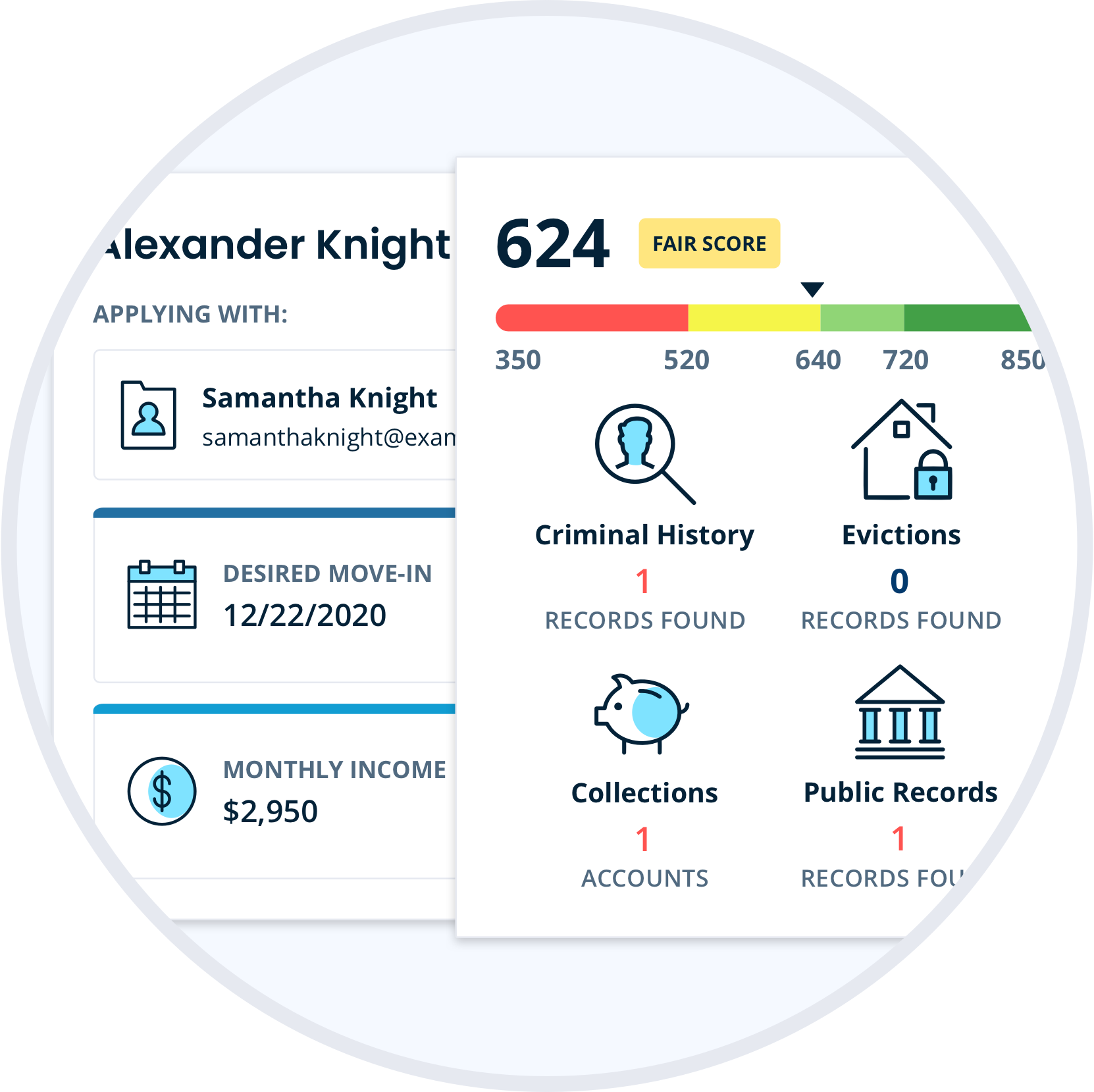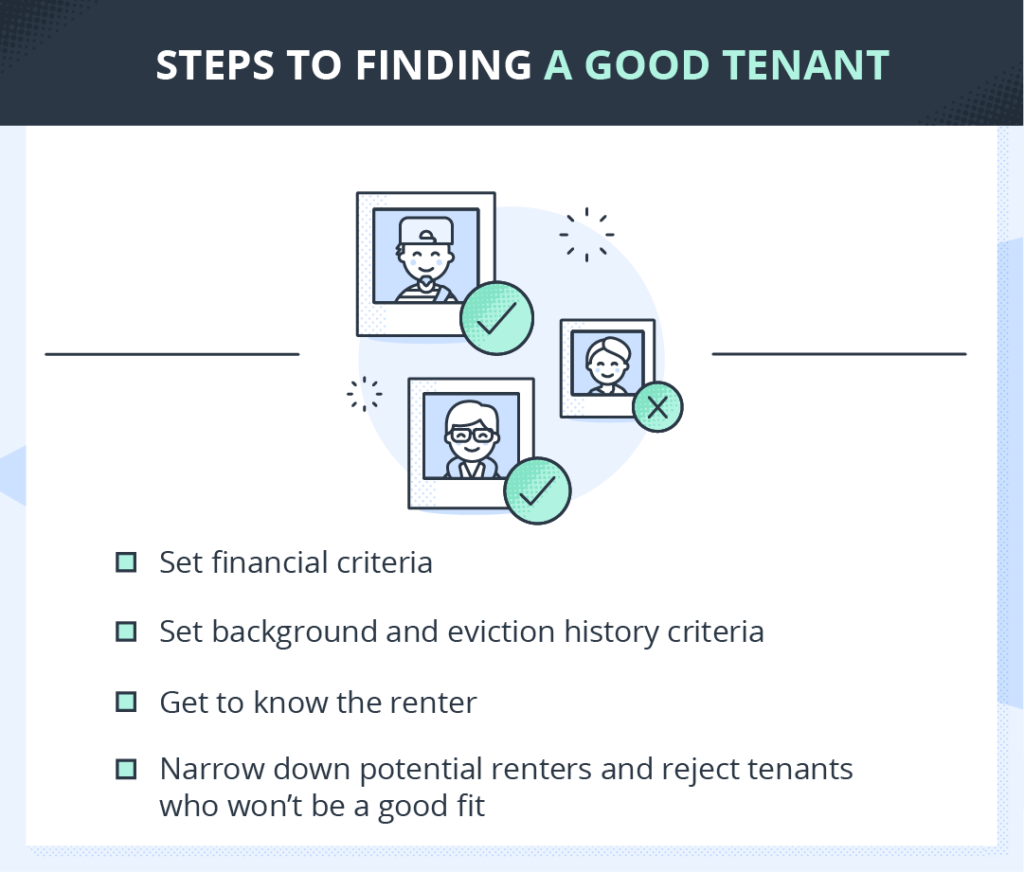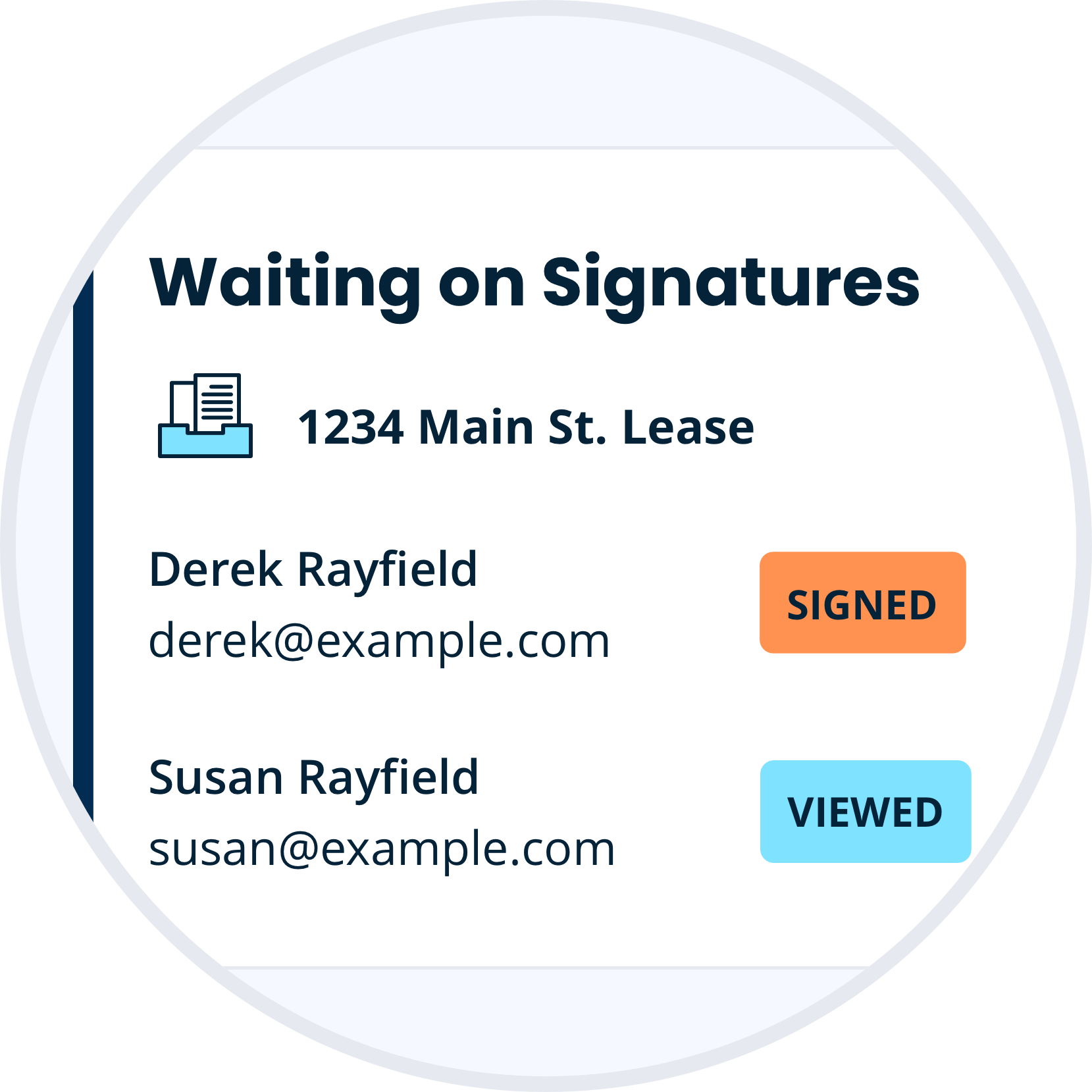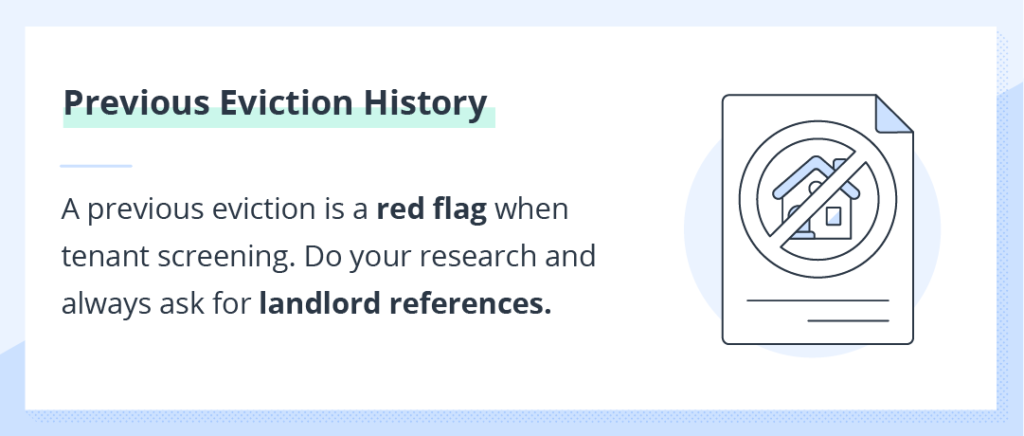When it comes down to filling your rental property, finding the right tenant is always the number one priority for landlords. One of the most common questions our landlords ask is: “how do I find a good tenant?” When you market your property and start receiving leads, sometimes it can feel like you have too many renters to choose from or you might not know the red flags to look out for. That’s where tenant screening comes in.
Below we’ll guide you through the step-by-step process of how to find a good tenant and how to set your tenant screening criteria.

Rent to a tenant you can trust.
In less than five minutes, request a comprehensive screening report that checks prospective renters’ credit, background, and eviction histories. Free for landlords.

Financial Criteria
Once you’ve invited tenants to apply and have screened applicants, your process of narrowing down the potential renter starts. As you’re learning how to find a good tenant, the first step is to establish a credit score range you will accept. Running a credit check gives you insights into a renter’s financial responsibility and if they have a history of making payments consistently and on time. Generally, a good rule of thumb is to accept tenants with a credit score of 560-850 – ultimately, the exact range is up to the landlord. The higher the credit score, the more reliable and responsible the tenant may be at paying rent. However, there are situations where your applicant might have a low credit score for other reasons:
No Credit History
If someone has no credit history, they will simply not have a credit score as there is no record to analyze. Six months of history is required to create a person’s first credit score – often younger renters and college students do not have a credit score to analyze. Read here for more details on what affects people’s first credit scores.
Low Credit Score, but Other Financials Look Good
Building up credit scores after missing payments can take a long time for many people and sometimes people’s credit scores are affected for reasons beyond their control. This is why it’s important to look at recent payments and pay stubs, and to get employment verification from potential renters. Talking with the tenant and getting to know them, as we will discuss below, will help you gain more information into why they might have a low credit score.
How to Rent to Someone with a Low Credit Score
There are a few options to rent to someone who has a low or no credit score. If they are a great fit for your property and have the financial means to pay rent, here are some easy options to provide a safety net:
- Have a co-signer or guarantor on the lease.
- Charge a larger security deposit – make sure to check local and state laws on security deposit limits.
- Get references from past landlords to discuss their tenancy.
- Require Rent Reporting, a TurboTenant credit-building service, to incentivize on-time rent payments.
Income and Collections
A credit score isn’t the only aspect of tenant screening you should be focused on – assessing financial history and income is also essential. For an applicant’s income, a common rent-to-income ratio is around 30% of gross income – checking a renter’s income will ensure prospective tenants can afford the monthly rent so they will pay in full and on time. You can easily calculate a rent-to-income ratio using our calculator.
When it comes to collections, no collections are a great sign that a renter has no debt and is consistent with payment obligations. It’s important to remember that collections will stay on a person’s credit report for seven years, even after they’ve been paid off. Once again, it is up to the landlord to talk to the tenant and then decide if they are comfortable with renting to someone with one or more collections – remember to always keep your property investment’s ROI at the forefront of your mind.

Create a Custom Lease Agreement
Set up customizable lease agreements right in your TurboTenant account! Purchase a single lease agreement, or subscribe and receive unlimited lease agreements, plus electronic signatures and landlord forms.
Background & Eviction History Criteria
A background and eviction history report includes thorough information regarding an applicant’s criminal background, public records, and more. For a full list of items included on a background and eviction history report, read here.
Setting Eviction History Criteria
Evictions are time-consuming and expensive. Many independent landlords cannot afford the direct costs or months of zero rent, which is why it’s best practice to run an eviction history report to help you avoid evictions altogether. Here is what landlords should be looking at when it comes to eviction history:
- A Previous Eviction: A previous eviction should be a red flag for landlords – whether it was for nonpayment or for other lease violations, it could be a risk to rent to a tenant who has previously been evicted. Reaching out to landlord references can help you determine if they have been a good tenant after the eviction on their record. You may also decide to discuss it with the tenant to get a better understanding of the situation.
- Good Income and Credit, but an Eviction History: Once again, obtaining past landlord references to see if they were a good renter in their last tenancy will help you determine if it is a risk worth taking. If it was an eviction due to nonpayment, the renter’s financial situation may have changed since then which is why it’s best to cover your bases and speak with past landlords. Even after completing the necessary research, if you have other great applicants that fit your screening criteria better with no evictions, it may be best to stick to the ones who pose a lesser risk.

Setting Background Check Criteria
A criminal background check is an essential part of tenant screening so you can protect yourself, your rental, and your neighbors. Here are a few important things for landlords to keep in mind when setting background check criteria:
When a Screening Report Shows a Criminal Background
A large part of screening tenants is to evaluate an applicant’s criminal history. The U.S. Department of Housing and Urban Development (HUD) in a memo advises landlords to look at every case closely to identify the arrests, if there was a conviction, the age of the conviction, the nature of the conviction, evidence of rehabilitation, and if the tenant has been a good renter since. Additionally, those with a criminal background or convictions are not a protected class under the Fair Housing Act. While HUD’s memo regarding arrest and conviction records are only guidelines, not law, it could still influence a judge’s decision in court. HUD advises landlords to look at each one on a case-by-case basis and disapproves of rejecting tenants who only have an arrest without conviction as this could have been a mistake or a long time ago – both of which could be irrelevant to how they are as a renter.
Want to learn more about the Fair Housing Act to avoid catching a discrimination charge? Enroll in the Fair Housing for Landlords course today!
What Won’t Show Up on a Background Check
Most of the information a landlord would need to determine a criminal background will be on a criminal background check – even traffic violations might show up. The one thing that might not is whether the applicant is a registered sex offender. However, the sex offender registry is a public database that anyone can check. Specific laws and statutes will vary from state to state so be sure to check your location’s guidelines.
Remember, as a landlord you are responsible for the safety of each of your tenants and can deny an applicant with a criminal record if there is a justifiable reason and if you already have policies in place that have proven to keep residents safe. Make sure to always check your local and state laws when you are screening tenants so you do not intentionally or unintentionally discriminate against applicants.
Know the Renter
While there are best practices when it comes to the hard data of tenant screening like we mentioned above, it can be equally important to focus on additional tenant screening practices such as checking social media, meeting with the tenant, and getting to know the potential renter better.
Setting Social Media Criteria
It seems like everyone has social media accounts these days and it can be a great tenant screening tool if used in the right way. When using social media for tenant screening, landlords must be careful they are still following Fair Housing laws and are not discriminating against applicants. However, if an applicant’s social media is public, the information on there is fair game for landlords, employers, and ultimately anyone to look at.
If you do decide to use social media in your tenant screening practices, treat every applicant the same – for example, check the same site for every renter you screen. LinkedIn could be great to confirm employment verification, Facebook could let you know about a pet that was not listed on the application, and Instagram could help you see if a tenant is prone to throwing parties that might get out of hand. Regardless of what you choose to look at, document everything – this is imperative to protect yourself from fair housing complaints. Just because you might disagree with someone’s political beliefs or life choices as seen on social media does not mean they wouldn’t be a good tenant. If you don’t think you’ll be able to look past these details then it’s best to stay away from social media as a tenant screening tool.
Meet the Renter In-Person
Getting to know an applicant other than what you read on a screening report can help you narrow down your applicant pool. Understanding more about who they are, their past rental experiences, and how they communicate will help you decide if they would be a good fit for the property. Meeting face-to-face at a coffee shop or during a tour of the rental is a great way to interview tenants who have already passed your screening report criteria.
Furthermore, meeting an applicant can give them time to answer additional questions you might have had such as why they may have a lower credit score or information about their pet. Here is a great list of questions you should ask and also questions you cannot ask tenants.
What if You Are Still Unsure of Who to Rent to?
After going through both the quantitative and qualitative criteria you’ve set for your tenant screening practices, you may still be stuck on which tenant to choose. This might be because of something on the screening report or because you have multiple tenants who you think would all be a good fit – so, which one do you choose?
Narrowing Down the Applicants
When it comes down to picking the right tenant, trusting your instincts is a huge component. You might have multiple tenants who are great on paper, but is there one you had better conversation and communication with? Setting your criteria beforehand will help you quickly check-off boxes when you’re screening tenants – sometimes it might be a wash on who would be a better tenant, but as long as they pass your criteria, hopefully, they will be able to turn into a long-term tenant.
What if There Were Only Minor Red Flags?
To protect your property, never just fill a vacancy to fill it – the costs of renting to a bad tenant could be more serious than if you waited a couple of weeks to find the right one. Once again, make sure to assess the red flags, and go through all the risks. For example, if a renter has a lower credit score, but you talked with their previous landlord who assured you they were a good tenant, you might feel more comfortable renting to this individual. Generally, with the right marketing and application, you will have a large pool of renters to make it easier to narrow down the options.
Rejecting a Tenant
When you find the right tenant or if you decide the risks are too much with a particular renter, notifying an applicant that you will not be renting to them is the professional and courteous thing to do as a landlord. Sending a simple email telling them you will not be offering them a lease is the easiest way to reject an application – just make sure you have documented it in case of a lawsuit. Doing it as soon as possible during the tenant screening process will help them continue to look for other rentals. Remember that Fair Housing laws require you to treat all tenants equally which means you must run every applicant through the same tenant screening criteria you established – you cannot reject an application based on gender, age, race, ethnicity, or any of the other protected classes. Once again, always check your local and state landlord-tenant laws to ensure you are staying compliant.
Setting tenant screening criteria will not only help you find the right tenants faster, but it will increase the ROI of your rental investment to ensure you have a responsible, paying, and possibly long-term renter. If you are ready to find a good tenant, sign up with TurboTenant today to start receiving leads.
Disclaimer: TurboTenant, Inc does not provide legal advice. This material has been prepared for informational purposes only. All users are advised to check all applicable local, state and federal laws and consult legal counsel should questions arise.









